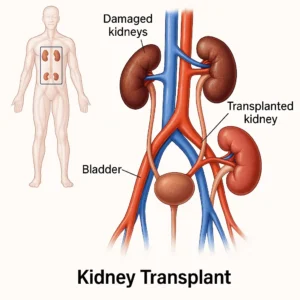About Kidney Transplant in India
Read the comprehensive guide to kidney transplantation treatment in India—if you’re a recipient looking for hope or a donor giving life. How and why transplants are done, cost of a kidney transplant in India, we have it all here. Learn more about how the procedure is done, get information on India’s best kidney transplant centres and doctors, and more on the most frequently asked questions by our foreign patients.

What is a Kidney Transplant?
Kidney Transplant or Renal Transplant is a procedure in which a person with completely failed kidneys will receive a healthy kidney from a person who has both the kidneys working in good condition. Thus, after the surgery both the men can continue to lead a healthy and normal life. The person receiving the kidney is called a “recipient” & the person donating the kidney is called a “donor”. After the transplant, the healthy kidney (the “graft”) takes over the functions of non working kidneys in the recipient.
Why Do We Need Kidney Transplant?
Kidney failure is most often a result of uncontrolled High Blood Pressure or High Diabetes. Untreated kidney failure can have a large impact on the person’s Heart and over all body functions.
● Diabetes mellitus
● High blood pressure
● Glomerulonephritis
● Polycystic Kidney Disease
● Severe anatomical problems of the urinary tract
The need for a Renal Transplant arises when a person’s kidneys have lost all their functions and the Kidneys function is being managed artificially by the help of Dialyzing Machines.
Kidney transplant remains the only cure for chronic kidney disease (CKD) or end-stage renal disease (ESRD).
What is the Candidature for Kidney Transplantation?
To undergo a kidney transplant, the recipient & donor both must be healthy &must NOT have:
● Infections such as TB, hepatitis or osteomyelitis
● Heart, lung, or liver disease
● Cancer
In-case either the recipient or donor has any other medical issue, then they must be treated for the same first before going for the kidney transplant.
Who is Suitable Donor for Kidney Transplant?
Suitable Kidney Donors
● Living related donor- First family relatives of the person receiving the kidney, i.e. either of the parents, siblings, or children are preferred donors. Being related, there is an increased chance of kidney being a stronger biological “match” for the patient & thus increases the chances of being accepted in a foreign body.
● Living unrelated donor – Friend or spouse can also donate. However, the recipient needs to be administered anti-rejection injections to reduce the chances of rejection of the transplanted kidney which is a foreign object in the body.
Many people worry that by donating a kidney they will become unhealthy or be in a dangerous situation. The living donor of the kidney is left with one healthy functioning kidney, which should be more than enough for the rest of the donor’s life. The donor’s activities are not usually limited.
What are the pre-evaluation & tests for Kidney Transplant?
Thorough investigations & evaluations of both the donor and recipient are done to ensure that the donor is perfectly healthy at the time of donation and that he /she continues to remain normal after donation. The potential recipient undergoes evaluation, adequate dialysis and is brought to an optimal state to withstand the major surgery of renal transplant. The tests done include:
● Blood tests or skin tests to check for infections
● Heart tests such as an EKG, echocardiogram, or cardiac catheterization
● Tests to look for early cancer
● Tissue and blood typing to help make sure the body will not reject the donated kidney
What is The Complete Procedure of Kidney Transplant Surgery? (Recipient)
During the Kidney transplant procedure, the surgeon places the new kidney in the abdomen and attaches it to the artery that supplies blood to kidneys and to the vein that carries blood away from the kidney. The kidney is also attached to the ureter, which carries urine from the kidney to the bladder.
What is The Complete Procedure of Kidney Transplant Surgery? (Donor)
The complete procedure of kidney transplant surgery is performed in 3 ways by which the doctors may take out the kidney from the donor. Here are the given primary ways of the kidney donation procedure for the donor:
1. Simple kidney removal or Open Nephrectomy
● The surgeon will make an incision (cut) up to 12 inches long. This cut will be on the side, just below the ribs or right over the last ribs.
● Muscle, fat, and tissue are cut and moved. The surgeon may need to remove a rib to do the procedure.
● The tube that carries urine from the kidney to the bladder (ureter) and blood vessels are cut away from the kidney. The kidney is then removed.
● Sometimes, just a part of the kidney may be removed
● The cut is then closed with stitches or staples.
2. Radical kidney removal or Radical Nephrectomy
During the kidney transplant surgery, the surgeon will make a cut about 8 to 12 inches long. This cut will be on the front of your belly, just below your ribs. It may also be done through the side.
● Muscle, fat, and tissue are cut and moved. The tube that carries urine from the kidney to the bladder (ureter) and blood vessels are cut away from the kidney. The kidney is then removed.
● The surgeon will also take out the adrenal gland and some lymph nodes.
● The cut is then closed with stitches or staples.
3. Laparoscopic kidney removal or Laparoscopic Nephrectomy
● The surgeon will make 3 or 4 small cuts, usually no more than 1-inch each, in your belly and side. The surgeon will use tiny probes and a camera to do the surgery.
● Towards the end of the procedure, the doctor will make one of the cuts larger (around 4 inches) to take out the kidney.
● The surgeon will cut the ureter, place a bag around the kidney, and pull it through the larger cut.
● This surgery may take longer than an open kidney removal. However, most people recover faster and feel less pain afterwards compared to open surgery.
What is the Post-Transplant Procedure for Kidney Transplant?
Special care is taken post-surgery to minimize the risk of infection. Both the recipient & donor are closely monitored to ensure that the new organ is accepted by the body and to ensure optimum immunosuppressant medication. Post-discharge hospital stay for the recipient is usually 7-8 days &for the donor is about 5 days only.
Follow Up Care Post Kidney Transplantation:
Both the recipient & donor should take due care post-transplant & follow the medicine regime, take anti-rejection drugs as advised, have diet-lifestyle modifications & follow-up consults with the doctor as advised.
The doctors will conduct regular blood and urine tests, monitor blood pressure, temperature, and urine output. Ultrasounds may be done to see if there are any abnormalities with the transplanted kidney.
The period immediately following your transplant may be very stressful. Due care should be taken after your kidney transplantation surgery treatment.
What are the Benefits & Advantages of Kidney Transplant?
● No longer be bound to dialysis schedules
● Increased strength, stamina, and energy
● Lead a relatively normal lifestyle
● Have a normal diet and more normal fluid intake
● Anaemia, a common problem with kidney failure, might be corrected after transplantation
● Reduced medication post-transplant if you have hypertension (high blood pressure)
How to Prepare for the Renal Transplant Surgery?
There are some documents required for a kidney transplant surgery in India.
● Pass Port, Driving License, Work permit, any other government ID
● 4 – pass port size photographs
● Affidavit of patient and donor stating that the patient and the donor are related to each other
● In case the donor is a wife additional document as Marriage certificate with photographs
● A declaration from the head of family or the wife of the donor stating that he/she has no objection if the donor donates the Kidney to the recipient.
What is The Cost of a Kidney Transplant in India?
The cost of a kidney transplant in India varies by hospital, surgeon, and post-surgery care. Compare the average cost of a kidney transplant at a top Indian hospital and plan your treatment with confidence.
Read more: 15 Most Common Questions on Kidney Transplant
Learn More Testimonial: Gabriel, Kidney Transplant, Kenya and Andrea, Kidney Transplant Surgery, Tanzania
Learn More: Top 7 Kidney Transplant Hospitals in India










